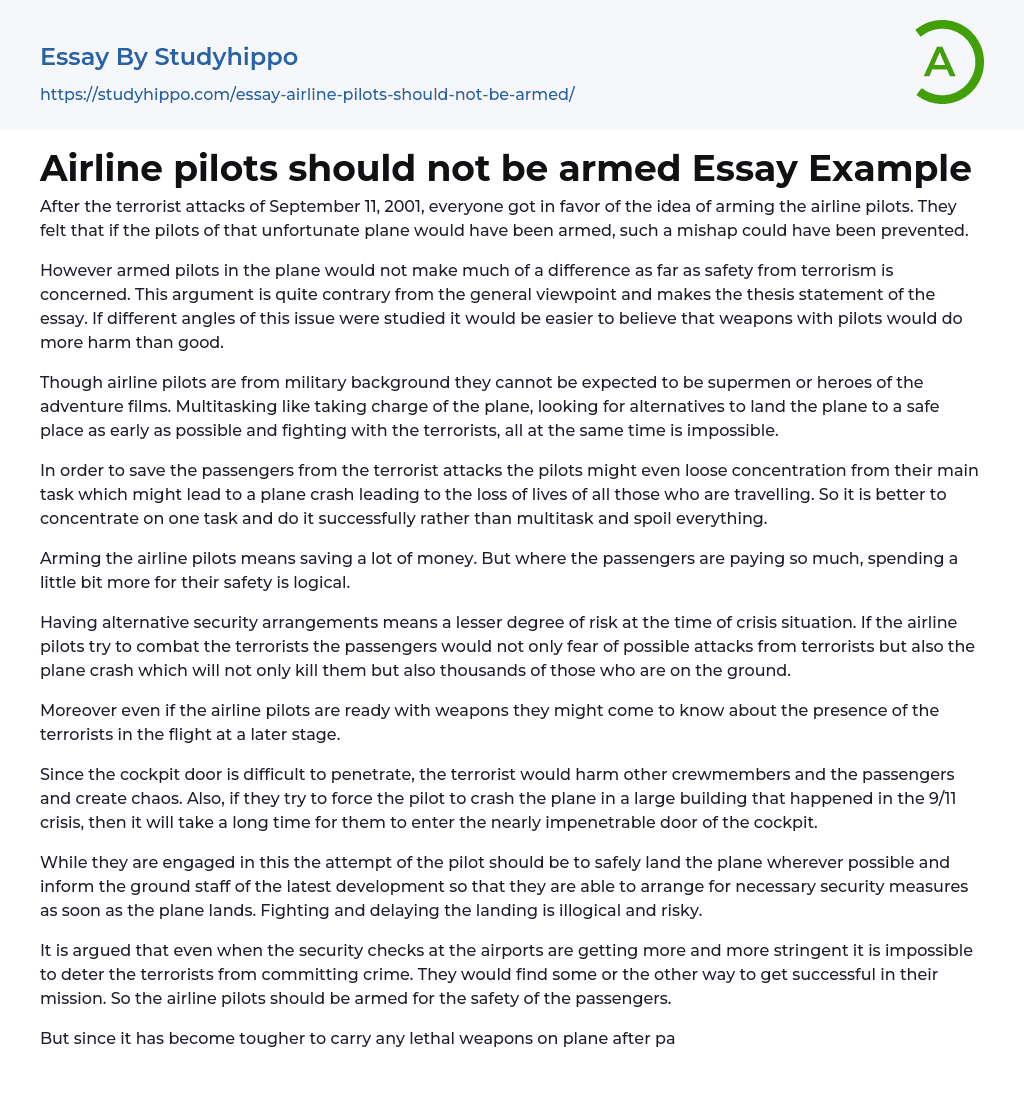After the September 11, 2001 terrorist attacks, there was a consensus on the advantages of arming airline pilots. It was widely believed that if the pilots on the plane involved in the tragic incident had been armed, it could have potentially prevented this catastrophic event.
Contrary to popular belief, having armed pilots on board does not greatly enhance safety against terrorism. This opposing argument forms the thesis statement of the essay, with different perspectives revealing that arming pilots may actually lead to more harm than good.
Even though airline pilots come from a military background, they cannot be seen as supermen or heroes from adventure movies. It is not feasible for them to carry out various tasks at the same time, such as taking control of the aircraft, looking for safe landing
...options, and dealing with terrorists all at once.
In order to prevent terrorist attacks and ensure passenger safety, it is essential for pilots to prioritize their primary responsibility. By maintaining focus on this task, the risk of a plane crash that could result in the loss of all passengers can be reduced. Therefore, it is more advantageous to concentrate on one task at a time and successfully accomplish it rather than attempting to multitask, which can jeopardize everything.
Arming the airline pilots as a safety measure would ultimately result in cost savings. Considering the significant amount passengers pay for their flights, it is only logical to allocate a little extra budget towards ensuring their safety.
Implementing alternative security measures during a crisis reduces the level of risk. If pilots engage in combat with terrorists
on board, passengers would fear both terrorist attacks and plane accidents, which could result in fatalities among those on the aircraft and potentially claim thousands of lives on the ground.
In addition, even if the airline pilots are armed, they may become aware of the terrorists' presence in the flight only at a later point.
Due to the challenging barrier of the cockpit door, terrorists may opt to harm crewmembers and passengers instead, resulting in chaotic situations. Furthermore, attempting to compel the pilot into crashing the plane into a large building, similar to 9/11 incident, would require considerable time as they would need to breach the extremely secure cockpit door.
In this situation, the main goal of the pilot is to safely land the plane and keep the ground staff informed of any updates. This allows for necessary security preparations upon arrival, making it impractical and dangerous to resist or delay the landing process.
Despite the increasing strictness of airport security checks, they may not be enough to stop terrorists from engaging in illegal activities as they will always find ways to succeed. Therefore, it is suggested that airline pilots should be armed with weapons to ensure passenger safety.
However, the increased security measures to prevent weapons smuggling on planes put armed airline pilots at risk of being targeted by terrorists. This creates a potential threat as terrorists could attempt to seize the pilots' weapons to achieve their goals. Allowing pilots to carry firearms, originally intended for safety reasons, may inadvertently lead to multiple casualties. Therefore, it is advised that pilots should not be allowed to have guns.
Some
argue that terrorists can create bullet holes in an aircraft, leading to a rapid depressurization risk. As a preventive measure, it is suggested that airline pilots should be armed.
The crew members would not have sufficient time to notify the pilots about the suicide terrorists on board, resulting in numerous bullet holes and making it impossible for armed pilots to prevent this situation within a few minutes.
According to Mackett, Mr. Ron J. Hinderberger - Director, Aviation Safety Boeing Company, has stated that a bullet hole would not likely cause a loss of cabin pressure. Even if it did, pilots are trained to handle a loss of cabin pressure easily. Therefore, pilots do not need weapons to deal with the problem of rapid depressurization; they are taught special techniques as part of their training process.
- Low-Cost Carrier essays
- Easyjet essays
- Non-Commissioned Officer essays
- Auction essays
- Balanced Scorecard essays
- Business Plans essays
- Expense essays
- Income essays
- Net Income essays
- Security Guard essays
- Singapore Airlines essays
- Battle essays
- Intranet essays
- Maintenance essays
- Simulation essays
- Inn essays
- Academia essays
- Higher Education essays
- Language Learning essays
- Studying Business essays
- Education System essays
- Study essays
- First Day of School essays
- Scholarship essays
- Pedagogy essays
- Curriculum essays
- Coursework essays
- Studying Abroad essays
- Philosophy of Education essays
- Purpose of Education essays
- Brainstorming essays
- Educational Goals essays
- Importance Of College Education essays
- Brown V Board of Education essays
- The Importance Of Higher Education essays
- Online Education Vs Traditional Education essays
- Academic And Career Goals essays
- Academic Integrity essays
- Brown Vs Board Of Education essays
- Distance learning essays
- Technology in Education essays
- Vocabulary essays
- Writing Experience essays
- Importance of Education essays
- Early Childhood Education essays
- Academic Degree essays
- Academic Dishonesty essays
- School Uniform essays
- Academic writing essays
- Cheating essays




